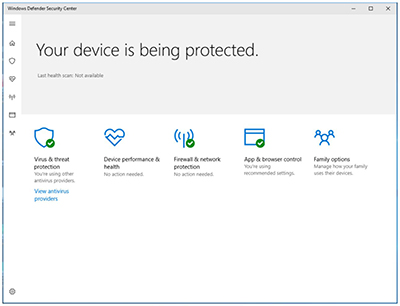News
Kaspersky Lab's Complaint Against Microsoft Continues Despite Windows 10 Improvements
Kaspersky Lab's chairman and CEO this week indicated how an antitrust dispute with Microsoft has been faring after about six months.
Eugene Kaspersky indicated in a Tuesday blog post that Kaspersky Lab's complaint before Russia's Federal Antimonopoly Service continues, although Microsoft appears to have made some positive changes to the Windows 10 "Redstone 2" released in April (the so-called "creators update" or version 1703). Still, Kaspersky Lab does plan to file a complaint with the European Commission on the matter, he indicated.
The complaints surfaced publicly in November when Kaspersky indicated that Windows 10 was favoring Windows Defender, Microsoft's built-in antimalware program, over other security software vendors' products. In this week's announcement, he illustrated how the initial designs of Windows Defender's status screens had steered consumers to turn on Windows Defender instead of providing information about the system's overall security status.
Windows 10 version 1703, though, now has a new "Security Center" screen, and it's been modified to indicate that a device is protected even if using antimalware software other than Microsoft's Windows Defender. The new screen, as posted by Kaspersky Lab, also shows that more than one antivirus provider can be installed with Windows 10 version 1703:
 [Click on image for larger view.]
Windows 10 version 1703 Security Center screenshot, showing device status and a link to view antivirus providers. Source: Kaspersky Lab May blog post.
[Click on image for larger view.]
Windows 10 version 1703 Security Center screenshot, showing device status and a link to view antivirus providers. Source: Kaspersky Lab May blog post.
Originally, Microsoft had planned to permit just one antimalware program to be installed on Windows 10, but that plan was "ditched," Kaspersky said.
In January, when Microsoft described the new Security Center, it indicated that users can install antimalware software from other vendors on Windows 10 systems. However, it also explained that Windows Defender will become activated if so-called "third-party" antimalware software is somehow seen as being incompatible with Windows 10.
Part of Kaspersky's complaint back in November had been that Microsoft's Windows 10 releases to software vendors now only gave them "several days," rather than a couple of months, to address compatibility issues. This faster release pace has sometimes led Windows 10 to see antimalware programs as being incompatible. In those cases, users didn't get messaging to install a compatible version. Instead, they got Windows Defender by default.
It's unclear if Microsoft has addressed this Windows 10 faster release complaint, as described by Kaspersky. His post this week didn't mention the issue. Update 5/4: a Kaspersky Lab spokesperson stated via e-mail that "this complaint is still on the table."
Windows 10 version 1703 permits multiple antimalware programs to be installed, but apparently only one of them can run. It's a common adage that consumers should not install multiple antimalware programs (although apparently they can with Windows 10 version 1703). Even Kaspersky Lab has advised against installing multiple antivirus programs because the two programs, if run concurrently, tend to see each other as viruses.
Another positive development in Windows 10 version 1703, according to Kaspersky this week, is that the Notification Center will now tell the user in a pop-up box that their antimalware subscription is due to expire if using third-party software. Previously, such notices just showed up in the Windows Security Center, he said, and independent software vendors had been prohibited from having warnings appear "five days before expiry and three days after." The obscurity of such notifications tended to cause Windows Defender to get turned on when those subscriptions lapsed, Kaspersky explained.
Kaspersky said he wasn't sure that Microsoft's changes in Windows 10 version 1703 were due to the complaints by Kaspersky Lab. He indicated that Kaspersky Lab was going ahead with meetings at the Federal Antimonopoly Service and remained "open to discussing these issues in detail with Microsoft." Kaspersky Lab currently has "more than a dozen" issues up for resolution before antitrust authorities, he said.
Kaspersky appealed for healthy competition, rather than monopolization, in the software security space. He commented that "the malicious members of the computer underground would love to have to deal with just one single AV installed everywhere."
About the Author
Kurt Mackie is senior news producer for 1105 Media's Converge360 group.